On the 150th anniversary of W.B. Yeats’s birth we look at some of the places in Sligo that inspired his best-loved poems.
1. BENBULBEN and DRUMCLIFFE CHURCHYARD: At his request, Yeats’s body was laid to rest in France and later removed to the churchyard in Drumcliffe, under Ben Bulben mountain, where his great-grand- father had served as rector. St. Columba founded a monastery here in the sixth century. Today, a magnificent 11th century high cross and remnants of a round tower still stand. The epitaph on Yeats’s gravestone derives from the last lines of “Under Ben Bulben.”
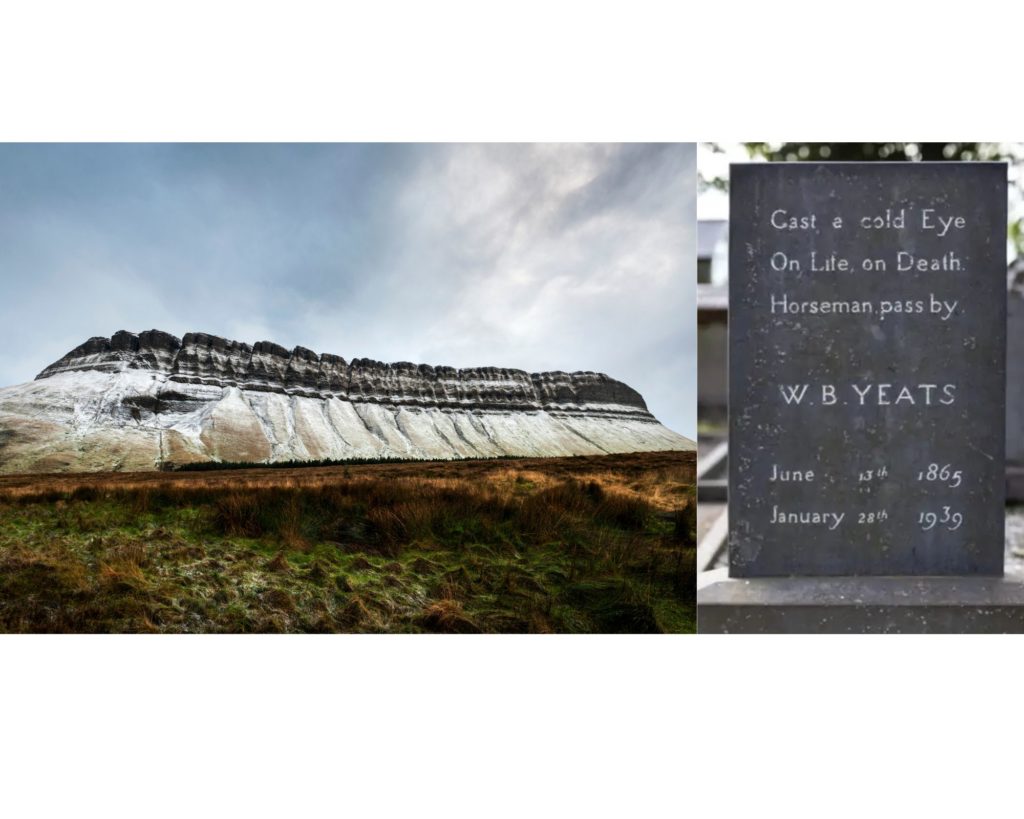
2. LOUGH GILL and INNISFREE: Named for the Irish goddess Gile, this beautiful freshwater lake and the rocky highland of Sleuth Wood that dips into it are the backdrop for Yeats’s poem “The Stolen Child.” As a teenager, Yeats had wished to imitate Thoreau by living on Innisfree. Later, while living in London, he longed for the seclusion of a pastoral setting, and he credited the sound of water from a fountain in a shop window as the inspiration for “The Lake Isle of Innisfree,” whose subject represented for him a life of simplicity surrounded by beauty.
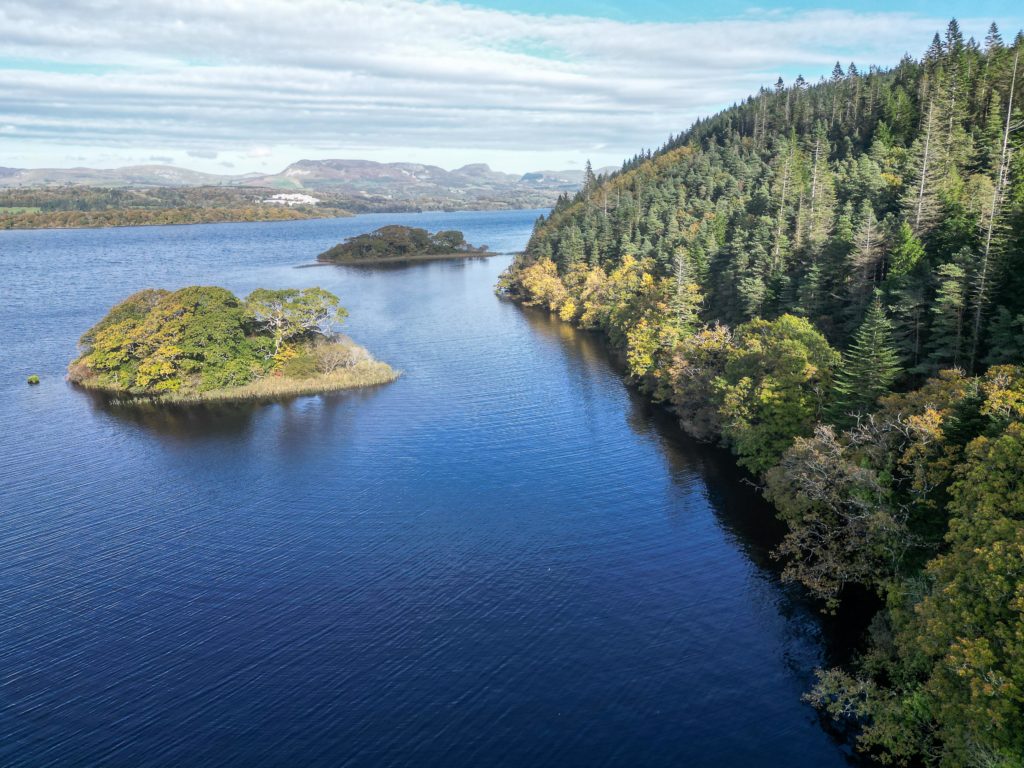
3. KNOCKNAREA: Dominating the landscape of Sligo town is this monolithic limestone hill. Scholars believe the unexcavated cairn conceals a Neolithic passage grave dating to 3000 B.C.E. In Irish lore, it is the grave of Queen Maeve. Yeats’s poem “Red Hanrahan’s Song of Ireland” describes the impact of the changeable weather on this landscape: “The wind has bundled up the clouds high over Knocknarea, / And thrown the thunder on the stones for all that Maeve can say.”
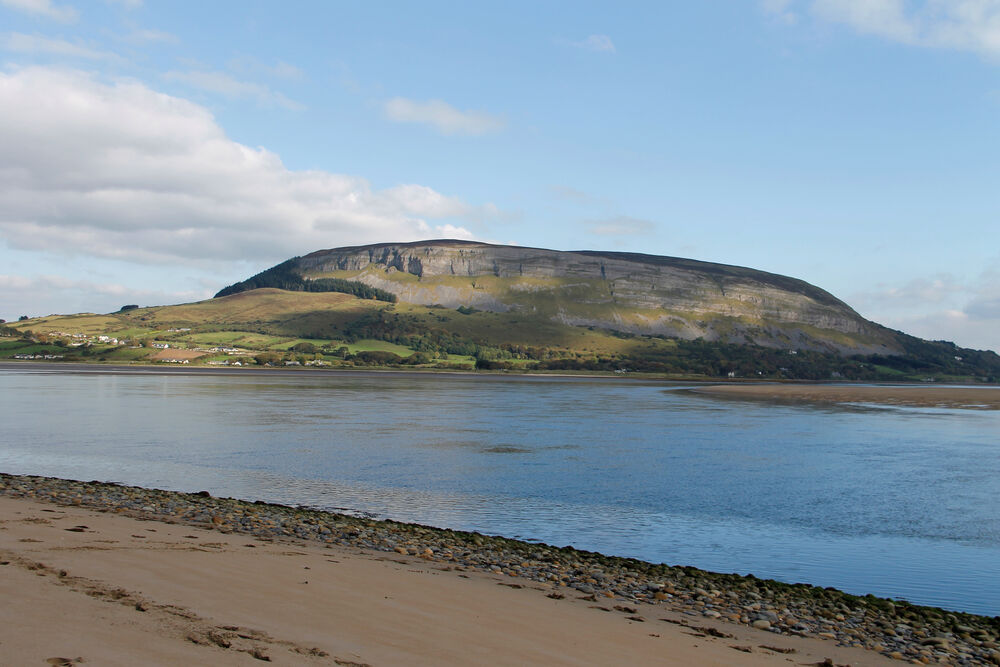
4. BALLYSADARE: Yeats often stayed at Avena House, his cousins’ home in Ballysadare. While there, he heard an old peasant woman singing a song; he would later reconstruct the song from three lines “imperfectly remembered.” The result was the well-loved poem of unrequited love “Down by the Salley Gardens.” “Weeping salley” was another name for weeping willows, which grew in thickets, or “salley gardens” – a favorite meeting point for lovers. In 1909 the poem was set famously to the Irish love song “The Moorlough Shore” by composer Herbert Hughes.
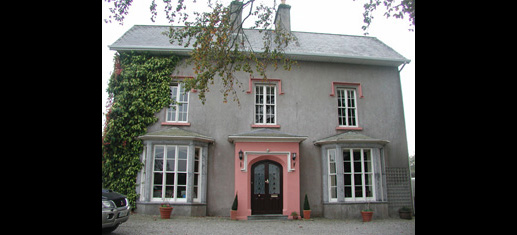
5. ROSSES POINT: Yeats and his brother Jack spent many happy summer holidays with their cousins, the Middletons, in this village, whose name also refers to the surrounding peninsula. Now in ruins, their home, Elsinor Lodge, was built by the smuggler Black Jack, whose ghost, the family claimed, would tap on the window panes at night. Yeats’s grandfather Pollexfen owned a shipping company there, and the seas, fishermen, and water lore were part of every visit. Yeats claimed that his poem “The Meditation of the Old Fisherman” was based on a conversation he had with a Sligo fisherman.
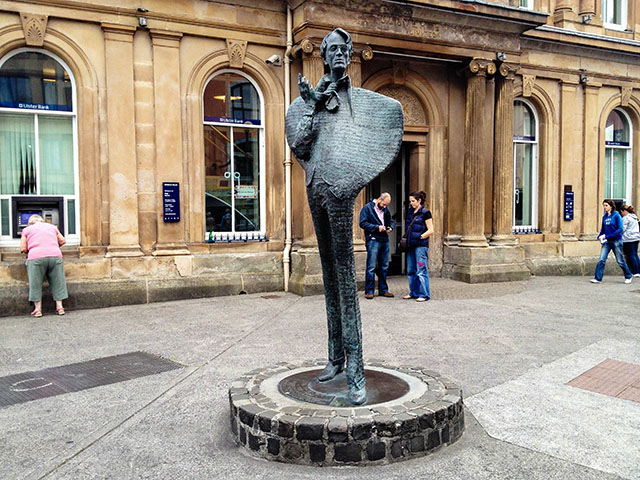
6. SLIGO TOWN: In Sligo Town is the great black and white ancestral mansion overlooking the quays to which Yeats’s family moved soon after his birth. On the Douglas Hyde Bridge, the Yeats Society’s headquarters house the Yeats International Summer School, the Hyde Bridge Gallery (including a photographic exhibition on the Yeats family and Sligo), and Lily’s and Lolly’s Cafe. Just over the bridge, outside the Ulster Bank on Stephen Street, is artist Rowan Gillespie’s bronze statue of Yeats, engraved with excerpts of his most famous works.
℘℘℘
UNDER BEN BULBEN
Swear by what the Sages spoke
Round the Mareotic Lake
That the Witch of Atlas knew,
Spoke and set the cocks a-crow.
Swear by those horsemen, by those women,
Complexion and form prove superhuman,
That pale, long visaged company
That airs an immortality
Completeness of their passions won;
Now they ride the wintry dawn
Where Ben Bulben sets the scene.
Here’s the gist of what they mean.
Many times man lives and dies
Between his two eternities,
That of race and that of soul,
And ancient Ireland knew it all.
Whether man dies in his bed
Or the rifle knocks him dead,
A brief parting from those dear
Is the worst man has to fear.
Though grave-diggers’ toil is long,
Sharp their spades, their muscle strong,
They but thrust their buried men
Back in the human mind again.
You that Mitchel’s prayer have heard
`Send war in our time, O Lord!’
Know that when all words are said
And a man is fighting mad,
Something drops from eyes long blind
He completes his partial mind,
For an instant stands at ease,
Laughs aloud, his heart at peace,
Even the wisest man grows tense
With some sort of violence
Before he can accomplish fate
Know his work or choose his mate.
Poet and sculptor do the work
Nor let the modish painter shirk
What his great forefathers did,
Bring the soul of man to God,
Make him fill the cradles right.
Measurement began our might:
Forms a stark Egyptian thought,
Forms that gentler Phidias wrought.
Michael Angelo left a proof
On the Sistine Chapel roof,
Where but half-awakened Adam
Can disturb globe-trotting Madam
Till her bowels are in heat,
Proof that there’s a purpose set
Before the secret working mind:
Profane perfection of mankind.
Quattrocento put in paint,
On backgrounds for a God or Saint,
Gardens where a soul’s at ease;
Where everything that meets the eye
Flowers and grass and cloudless sky
Resemble forms that are, or seem
When sleepers wake and yet still dream,
And when it’s vanished still declare,
With only bed and bedstead there,
That Heavens had opened.
Gyres run on;
When that greater dream had gone
Calvert and Wilson, Blake and Claude
Prepared a rest for the people of God,
Palmer’s phrase, but after that
Confusion fell upon our thought.
Irish poets learn your trade
Sing whatever is well made,
Scorn the sort now growing up
All out of shape from toe to top,
Their unremembering hearts and heads
Base-born products of base beds.
Sing the peasantry, and then
Hard-riding country gentlemen,
The holiness of monks, and after
Porter-drinkers’ randy laughter;
Sing the lords and ladies gay
That were beaten into the clay
Through seven heroic centuries;
Cast your mind on other days
That we in coming days may be
Still the indomitable Irishry.
Under bare Ben Bulben’s head
In Drumcliff churchyard Yeats is laid,
An ancestor was rector there
Long years ago; a church stands near,
By the road an ancient Cross.
No marble, no conventional phrase,
On limestone quarried near the spot
By his command these words are cut:
Cast a cold eye
On life, on death.
Horseman, pass by!
THE LAKE ISLE OF INNISFREE
I will arise and go now, and go to Innisfree,
And a small cabin build there, of clay and wattles made;
Nine bean-rows will I have there, a hive for the honey-bee,
And live alone in the bee-loud glade.
And I shall have some peace there, for peace comes dropping slow,
Dropping from the veils of the morning to where the cricket sings;
There midnight’s all a glimmer, and noon a purple glow,
And evening full of the linnet’s wings.
I will arise and go now, for always night and day
I hear lake water lapping with low sounds by the shore;
While I stand on the roadway, or on the pavements grey,
I hear it in the deep heart’s core.
THE SONG OF WANDERING AENGUS
I went out to the hazel wood,
Because a fire was in my head,
And cut and peeled a hazel wand,
And hooked a berry to a thread;
And when white moths were on the wing,
And moth-like stars were flickering out,
I dropped the berry in a stream
And caught a little silver trout.
When I had laid it on the floor
I went to blow the fire a-flame,
But something rustled on the floor,
And someone called me by my name:
It had become a glimmering girl
With apple blossom in her hair
Who called me by my name and ran
And faded through the brightening air.
Though I am old with wandering
Through hollow lands and hilly lands,
I will find out where she has gone,
And kiss her lips and take her hands;
And walk among long dappled grass,
And pluck till time and times are done,
The silver apples of the moon,
The golden apples of the sun.
THE HOSTING OF THE SIDHE
The host is riding from Knocknarea
And over the grave of Clooth-na-bare;
Caolte tossing his burning hair
And Niamh calling Away, come away:
Empty your heart of its mortal dream.
The winds awaken, the leaves whirl round,
Our cheeks are pale, our hair is unbound,
Our breasts are heaving, our eyes are a-gleam,
Our arms are waving, our lips are apart;
And if any gaze on our rushing band,
We come between him and the deed of his hand,
We come between him and the hope of his heart.
The host is rushing ’twixt night and day,
And where is there hope or deed as fair?
Caolte tossing his burning hair,
And Niamh calling Away, come away. ♦
Deborah Schull is CEO and founder of Cultural RoadMapp, hands-free audio tours for motorists, currently in development. Research by Meg Maher. For more information, email deborah@culturalroadmapp.com, or visit culturalroadmapp.com.
The videos in this post are courtesy of Jake Mac Manus, director and tour guide for Trek Ireland. For more walking tour videos of County Sligo, or for more information, click here. For more of Jake Mac Manus’s tour guide videos, visit his YouTube channel here.

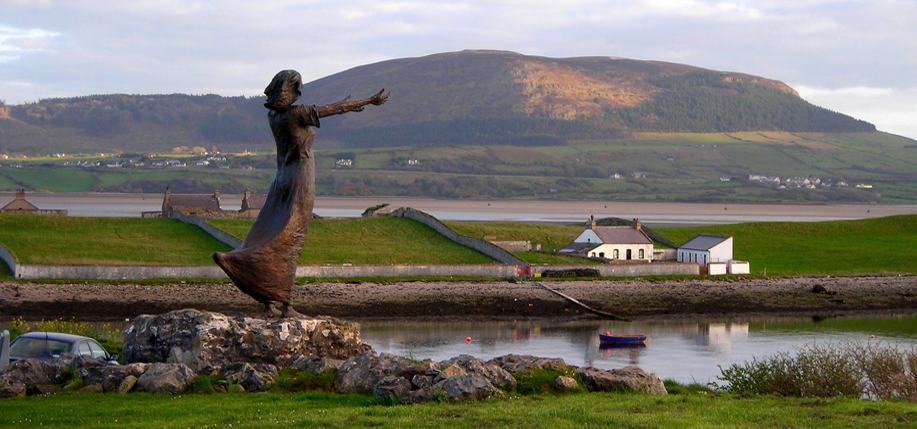
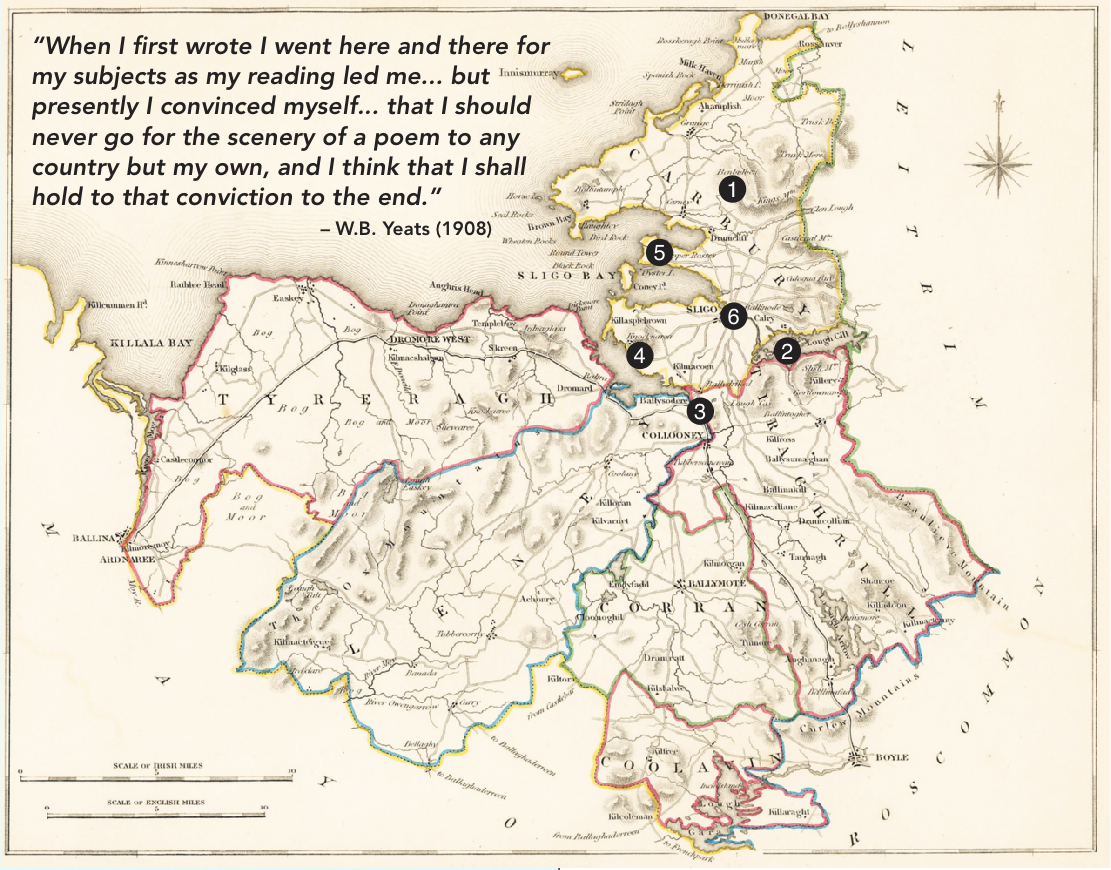

Thank you, Irish America, Ms Harty, et al for celebrating the great Yeats. On the approaches into Rome, back in the day, great people were buried alongside the roads that led into the city. Many of these people rode or were drawn by horses. Ergo, Yeat’s words: “Horseman pass by.”
Whoops, I think my previous post may be a bit confusing. I meant that people were buried by the side of the road, leaving wise inscriptions on their tombs for passing horsemen to read.
My mother, rest her soul, used to see Jack Yeats, W.B’s brother, hurrying around Dublin with a canvas under his arm. Thank God for giving us the amazing lists in literature, our little country, and our people, one of the oldest in the world, as old as the Greeks and the Jews and such an elder brother to England and all the rest of Europe.
The shortest poem written by Yeats includes lines like these.: Three ducks in a pond./ A mossy bank beyond/ To remember for years./To remember with tears.